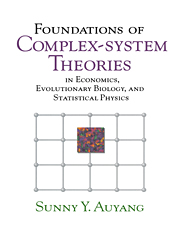Book contents
- Frontmatter
- Contents
- Preface
- 1 Introduction
- PART I EQUILIBRIUM
- 2 Theories of Composite Systems
- 3 Individuals: Constituents and Systems
- 4 Situated Individuals and the Situation
- 5 Interacting Individuals and Collective Phenomena
- 6 Composite Individuals and Emergent Characters
- PART II DYNAMICS
- Notes
- Bibliography
- Name Index
- Subject Index
2 - Theories of Composite Systems
Published online by Cambridge University Press: 11 May 2010
- Frontmatter
- Contents
- Preface
- 1 Introduction
- PART I EQUILIBRIUM
- 2 Theories of Composite Systems
- 3 Individuals: Constituents and Systems
- 4 Situated Individuals and the Situation
- 5 Interacting Individuals and Collective Phenomena
- 6 Composite Individuals and Emergent Characters
- PART II DYNAMICS
- Notes
- Bibliography
- Name Index
- Subject Index
Summary
Organizational and Descriptive Levels of the World
The physicist Richard Feynman closed his lecture on the relations among various sciences by contemplating a glass of wine. He said if we look at the wine closely enough we see the entire universe: the optics of crystals, the dynamics of fluids, the array of chemicals, the life of fermentation, the sunshine, the rain, the mineral nutrient, the starry sky, the growing vine, the pleasure it gives us. “How vivid is the claret, pressing its existence into the consciousness that watches it! If our small minds, for some convenience, divide this glass of wine, this universe, into parts – physics, biology, geology, astronomy, psychology, and so on – remember that nature does not know it!”
Feynman did not mention the price tag, the symbol of the market economy. The division of intellectual labor he highlighted, however, underlies the success of science just as the division of labor generates the prosperity in which common people can enjoy fine wines from around the world. How is the division of intellectual labor possible? What are the general conditions of the world that allow so many scientific disciplines to investigate the same glass of wine? What does the organization of science tell us about the general structure of theoretical reason?
Our scientific enterprise exhibits an interesting double-faced phenomenon. On the one hand, scientists generally acknowledge that everything in the universe is made up of microscopic particles.
- Type
- Chapter
- Information
- Foundations of Complex-system TheoriesIn Economics, Evolutionary Biology, and Statistical Physics, pp. 39 - 83Publisher: Cambridge University PressPrint publication year: 1998



